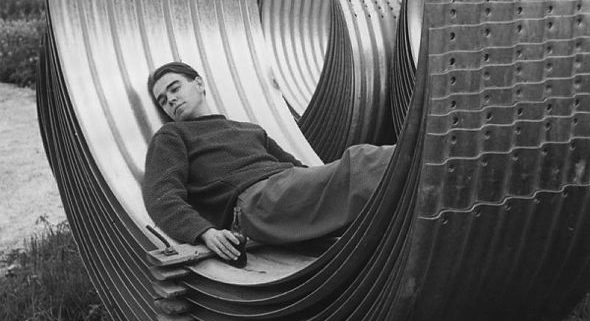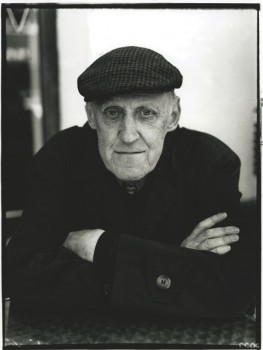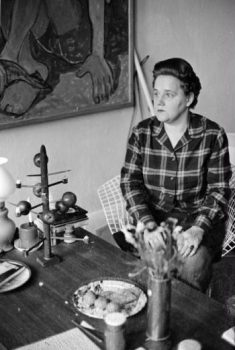Tag: poetry
On Pentti Saarikoski
Issue 4/1977 | Archives online, Authors

Pentti Saarikoski (1937–1983). Photo: Markku Rautonen / Otava
Born in 1937, Pentti Saarikoski was one of the many Finnish children who were evacuated to safety in Sweden during the Second World War. For almost twenty years – 1958–1975 – he had a sensational career as the enfant terrible of the new wave of post-war Finnish verse and as a translator of classical Greek poetry. Now Saarikoski is once more in Sweden, where he lives in a kind of spiritual and intellectual exile. The vast scope of Saarikoski’s work as a translator reveals the breadth of his interests and poetic skill. Among his translations into Finnish are works by Aristotle, Euripides, Sappho, Theophrastus, Xenophon and Homer’s Odyssey (a free verse translation that has been particularly praised for the freshness it brings to the work). Saarikoski’s translations of J. D. Salinger and Henry Miller have introduced modern urban slang into Finnish literature, and together with his brilliant translation of James Joyce’s Ulysses (1964) epitomise the catholicity of his interests. Saarikoski’s first poems were written in the spirit of ‘Finnish Modernism’: short poems, pleasing in their treatment of language, subtly erotic and ironic, drawing their strength from a fleeting image, metaphor or momentary fancy. Early in the 1960s, Saarikoski emerged from his scholarly retreat. He became a favourite of the yellow press and of television, he was held in the awe normally reserved in other parts of the world for royalty and pop stars. He loved this publicity and the scandal he deliberately created: he saw his function as to provoke the youth of the day to reject established ideas of authority and morality. He further outraged the middle classes (into which he himself was born) by joining the Communist Party.
More…
On Bo Carpelan
Issue 3/1977 | Archives online, Authors

Bo Carpelan. Photo: Ulla Montan
For a small country Finland is richly endowed with poets. Of particular interest, in view of the smallness of the Finland-Swedish population (about 7% of the total), is the number of poets who speak and write Swedish as their first language and consistently produce work of outstanding quality. International recognition of the work of one of these poets came earlier this year with the award of the Nordic Council Literary Prize to Bo Carpelan.
Carpelan’s first volume of verse, Som en dunkel värme (‘Like a dark warmth’) appeared in 1946. Since then he has brought out a further ten volumes of poetry and six prose works (all published by Schildt, Helsinki). It would be difficult, and probably premature, to attempt any detailed analysis of the fusion of influences and inspiration that have come together in Carpelan’s poetry. It is clear, however, that his early work has points of contact with the Finland-Swedish modernism of the 1920s and that he followed with particular interest the 40-talists, a group of Swedish poets active in the 1940s: the influence of their heavy, profuse imagery can be discerned in his early collections.
Critics identify two main periods in Carpelan’s poetry. The first of these is represented by his first volume and by Du mörka överlevande (‘You dark survivor’, 1947), Variationer (‘Variations’, 1950), Minus sju (‘Minus seven’, 1952) and Objekt för ord (‘Objects for words’, 1956). The second period begins with the collection Landskapets förvandlingar (‘The changing landscape’, 1957) and was followed by Den svala dagen (‘The cool day’, 1961), 73 dikter (’73 poems’, 1966), Gården (The courtyard’, 1969), Källan (‘The spring’, 1973) and most recently by I de mörka rummen, i de ljusa (‘In the dark rooms, in the bright ones’, 1976). In all his poetry Carpelan sees life as a mystery, but his approach to this mystery changes and develops. In his earlier works his language is deft, yet at the same time private and intimate, later it becomes sharp and simple. More…
Two Poems
Issue 1/1977 | Archives online, Authors, Fiction, poetry

Eeva-Liisa Manner, 1963. Photo: E. Lahtinen
Eeva-Liisa Manner (born 1921) has enjoyed a high reputation as a poet since the 50s. With Tämä matka (‘This journey’, Tammi 1956) she established herself as one of the leading poets of the period.
So far she has published 10 collections of poems. In addition, she has excelled as a playwright, novelist and
translator. Her three plays Uuden vuoden yö (‘New Year’s Eve ‘, Tammi 1965), Toukokuun lumi (‘Snow in May’, Tammi 1967) and Poltettu oranssi (‘A shade of burnt orange’, Tammi 1968) have acquired a permanent place in the repertory of many Finnish theatre companies. Her poetic drama Eros ja Psykhe (‘Eros and Psyche’, Tammi, 1959) has been published in German and a Swedish version of her novel Varokaa voittajat (‘Victors, beware’ Tammi 1972; Mainakes hundar, Schildt) was published in 1974. She was awarded the State Prize for Literature five times between 1952 and 1967, and has received two major prizes for her translations (the Mikael Agricola Prize in 1967 and the State Prize for Translators in 1975). Her poems reflect a deep feeling for music and a special interest in mythology. The influence of oriental philosophy is also clearly discernible. The strong intellectual content of her poetry and its disciplined technique have won her a circle of devoted readers, while her prose writings and her translations of Hermann Hesse and Oscar Parland have reached an even wider public. In a lighter vein, she has ventured into the field of detective novels. Her most recent work is one of humorous and satirical verse: the two poems below are from Kamala kissa (‘An awful cat’, Tammi 1976). While devotees of Old Possum will have no difficulty in recognizing the characters, those familiar with the present cultural scene in Finland may detect nuances never dreamed of by Eliot.
The poems have been ‘remodified’ into English by Herbert Lomas.
Jack, the Terror of the Thames
Jack was a yobbo who lived in an alley,
And his clobbering of rats could hardly be called pally.
He was one of pollution’s blackest of gems
And proud of his cognomen – the Terror of the Thames.
Big-shouldered he was, a good fifteen-pounder
And rejoiced in a furcoat that made him look rounder.
He’d an ear like an aerial, precise and pricked funny,
And only one eye, as hard as money. More…
-
Monthly archive
-
Yearly archive
-
Search our archives
-
You can search for texts using author names or free search terms.
Find texts matching either just one search term (OR query) or require all words to appear (AND query). Use quotes when searching for phrases, for example "search phrase".
-
© Writers and translators. Anyone wishing to make use of material published on this website should apply to the Editors.
